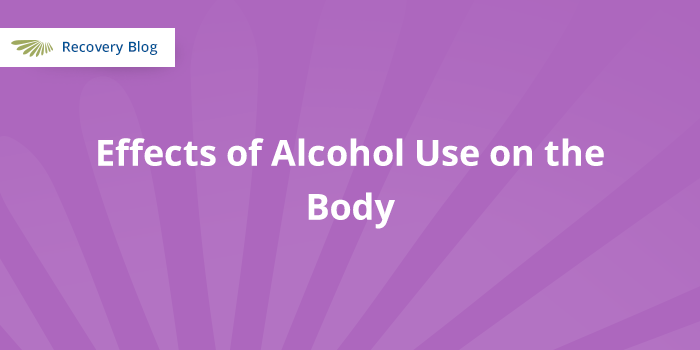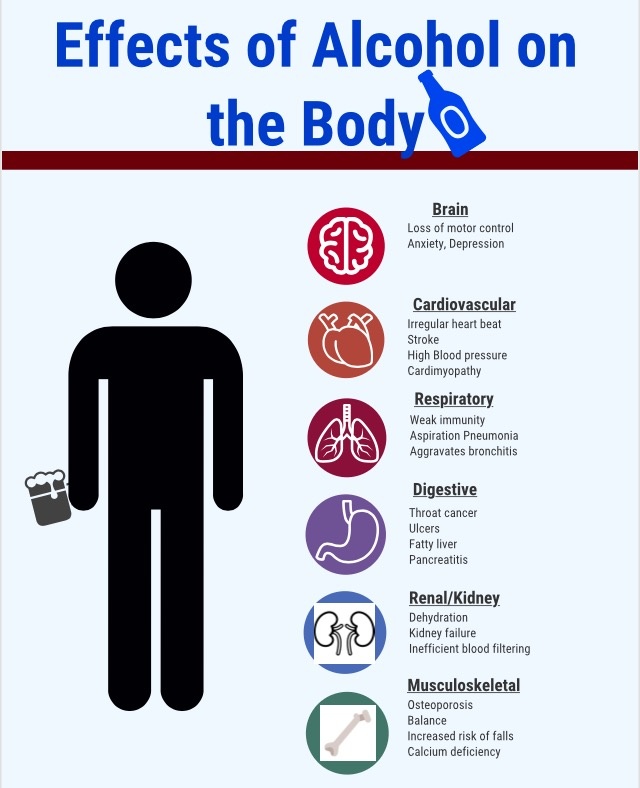This is Why Drinking Actually Makes You Feel More Stressed Out
If you pine for a cold one, a decantered one, or one on the rocks after a busy day at the office,...

Alcohol has significant short-term and long-term effects on nearly every system in the body. Let's examine some of the short-term and long-term effects of alcohol on the human body.
When alcohol enters the bloodstream, it acts primarily as a central nervous system depressant. These effects appear within minutes and vary based on the amount consumed, body weight, and tolerance.
Brain and Nervous System: Alcohol impairs coordination, slows reflexes, and reduces inhibitions. At higher doses, it can cause slurred speech, poor judgment, and memory lapses.
Cardiovascular System: It may temporarily increase heart rate and blood pressure, but in high amounts can lead to irregular heart rhythms.
Digestive System: Alcohol irritates the stomach lining, potentially causing nausea, vomiting, or acid reflux.
Dehydration: Alcohol is a diuretic, increasing urine production and contributing to dehydration and headaches.
Risk of Injury: Impaired motor skills and judgment increase the likelihood of accidents, falls, and risky behavior.
Chronic heavy drinking can lead to serious and sometimes irreversible damage to multiple organ systems.
Liver Damage: The liver metabolizes alcohol, but excessive intake can cause fatty liver, alcoholic hepatitis, fibrosis, and cirrhosis.
Brain Changes: Prolonged use can result in memory problems, cognitive decline, and an increased risk of mental health disorders.
Cardiovascular Problems: Long-term alcohol misuse is linked to high blood pressure, cardiomyopathy (weakened heart muscle), and stroke.
Digestive Issues: Persistent alcohol consumption increases the risk of gastritis, pancreatitis, and certain cancers (mouth, esophagus, liver, colon).
Weakened Immune System: Chronic drinking impairs the immune response, making the body more vulnerable to infections.
While alcohol can produce temporary feelings of relaxation, it is also associated with increased anxiety, depression, and irritability over time. Dependence and addiction (alcohol use disorder) can develop, leading to withdrawal symptoms such as tremors, sweating, and severe agitation when not drinking.
Read more: How Alcohol Affects Mental Health
Pregnant Individuals: Alcohol can cross the placenta, potentially causing fetal alcohol spectrum disorders (FASD), which include developmental delays, growth issues, and lifelong cognitive impairments.
Adolescents: Alcohol use in adolescence can disrupt brain development, affecting memory, learning, and emotional regulation. Marijuana use in teens is also harmful.
Older Adults: Age-related changes in metabolism make older individuals more sensitive to alcohol’s effects, increasing the risk of falls and health complications.
Health authorities often define moderate drinking as up to one drink per day for women and up to two for men. However, “safe” limits vary by individual, and some people should avoid alcohol entirely, including those with certain medical conditions, those taking specific medications, and individuals recovering from alcohol dependence.

Not drinking for 30 days can have a noticeable impact on your overall health and wellness and having a "Dry Month" is becoming more and more common.
Not sure you can go without a drink for 30 days? It may be a sign of alcohol use disorder. Contact us and we can help you take the first step to a life without alcohol dependancy.
If you pine for a cold one, a decantered one, or one on the rocks after a busy day at the office,...
The common effects of alcohol on the body are well documented, but what about the seemingly more...
One of the pitfalls of successful recovery from addiction is relapse. There are many factors that...